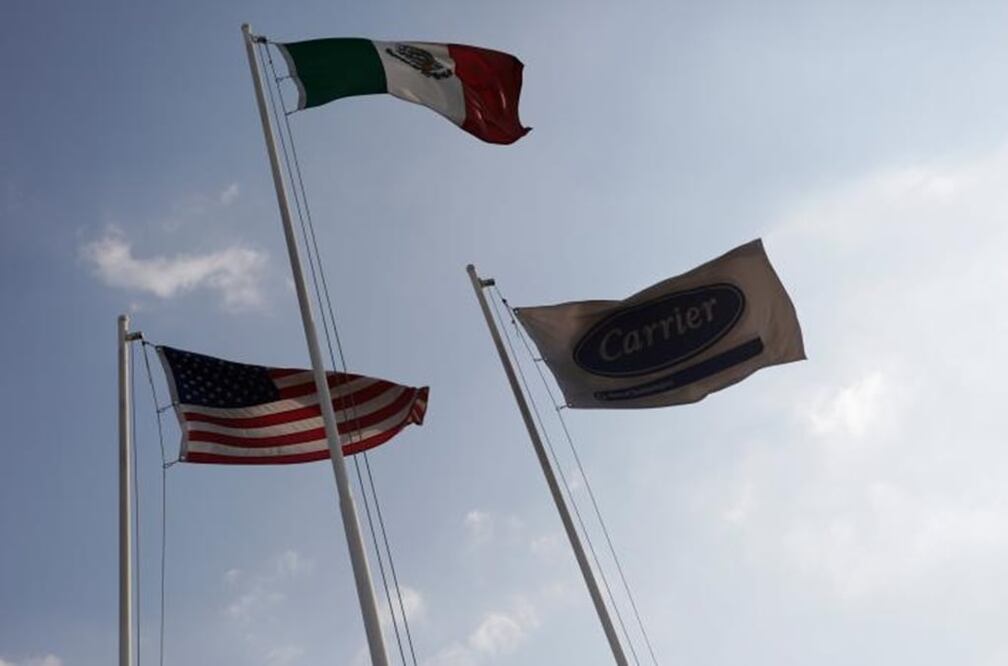Más Información

Sheinbaum confirma acuerdo con PT y PVEM, para impulsar reforma electoral; se enviará al Congreso este mes, anuncia

Anticorrupción sin titular, señala expresidenta Vania Pérez; comisionada está acusada por abuso de funciones y desvío de recursos, sostiene

Monreal exhorta a Layda Sansores a respetar división de poderes en Campeche; "afectan unidad e imagen del partido", dice
Donald Trump's threats to battle Mexico over trade, investment and jobs have pushed a growing number of companies operating in the country to put expansion plans on hold until the president-elect fleshes out his policies, business leaders have told Reuters since the Nov. 8 election.
Pledging to recast a joint trade deal and protect U.S. industry from outsourcing to Mexico, Trump landed his first blow last week, announcing a deal with United Technologies Corp's Carrier unit to stop it shifting about 1,000 jobs south of the border.
Trump's unorthodox move, involving state tax breaks, sent a chill through executives still uncertain which policies the president-elect would pursue upon assuming office on Jan. 20. On the campaign trail, he threatened to levy hefty tariffs on Chinese and Mexican-made products.
"If he puts an import duty on Mexican goods, it's going to be a total disaster," said Maurizio Rosa, chief executive of Codan Rubber Mexico, a maker of hoses for the auto industry with annual sales of some 200 million pesos ($10 million).
Codan and other companies in Mexico are plugged into the 1994 North American Free Trade Agreement (NAFTA) between the United States, Mexico and Canada, which Trump has threatened to dismantle if he cannot renegotiate it.
Over half of Codan's output goes directly to the United States, and "probably the rest" indirectly through other firms, said Rosa, whose clients include automakers Nissan Motor Co Ltd, Volkswagen AG (VOWG_p.DE) and tractor maker Kubota Corp.
Until it becomes clear what Trump means for business, new investment at the firm has been put on hold, he said.
U.S. DEPENDENCY
Mexico wants to reduce its economic dependency on the United States, and a recent auction of deep-water oil fields was notable for the pledges made by investors from China, Australia, Malaysia and elsewhere.
But most big investments made since NAFTA have served to further integrate Mexican manufacturing with the United States.
The Friday after Trump's election victory, the Mexican Association of Industrial Parks (AMPIP) surveyed members internally on what implications it had for business, getting eight replies.
The as-yet-unpublished survey found that 37.5 percent of pending projects - eight in total - had been put on hold, mostly until 2017. The rest were still going ahead.
Nearly half of the $425.7 billion foreign direct investment (FDI) in Mexico between 1999 and 2015 came from the United States. Such investment has been a cornerstone of U.S.-Mexican trade, today worth $500 billion annually.
But Trump's renewed threats of punitive tariffs on goods made abroad by U.S. companies may threaten that flow of investment. Shortly after his deal with Carrier, Trump revived his campaign on Twitter to slap a 35 percent tariff on such goods coming into the United States.
Mexico is more immediately exposed to the risk of a trade war, given it sends 80 percent of its exports to U.S. buyers, five times the U.S. proportion going to Mexico.
Economists have already highlighted the risks.
After Trump's win, HSBC slashed its 2017 Mexican growth forecast to 1.7 percent from 2.3 percent, saying most of the hit would likely come from reduced FDI and private investment.
Credit rating firm Fitch on Friday flagged the risks Trump posed to trade and investment as it revised down Mexico's outlook to negative from stable.
SMALLER FIRMS EXPOSED
Emilio Cadena, CEO of Grupo Prodensa, a specialist in helping foreign companies move to Mexico, estimated one in 10 such businesses - all "smaller firms" - had put investments on hold while uncertainty persisted over U.S.-Mexico relations.
Business lobbies said major investments are still proceeding as planned, but smaller firms focused on the U.S. market are less able to absorb potential shocks.
Bosco de la Vega, a partner in Agro Groppo, a potato producer in the northern state of Sinaloa, said his firm has now put off a $5 million investment for at least four to six months.
The company and its partners had planned to purchase a Mexican firm to help them export more to the United States.
Luis Aguirre, vice president of industry confederation Concamin, said some smaller foreign manufacturers were also in a holding pattern because of uncertainty caused by Trump. A survey of German companies in Mexico published on Wednesday showed that 83 percent expected Trump's trade policy to have a negative impact on business.
Carlo Bonfante, economy minister of the border state of Baja California, said that none of the 2017 investment already in the pipeline for the state was on hold yet, but that firms would likely wait until April before making their next move.
"There'll be a pause for analysis that there wouldn't have been if Trump hadn't won," he said.
Noticias según tus intereses
[Publicidad]
[Publicidad]











